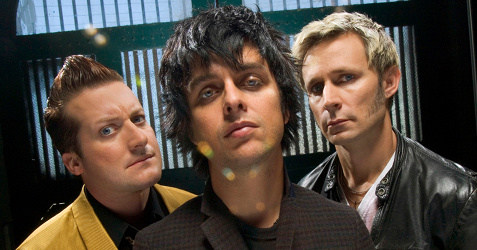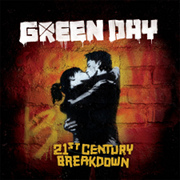21st Century Breakdown
- Rock/Alternative/Pop
- 2009
- Buy the CD
Reviewed by David Medsker
()
Give the band credit, then, for not shying away from the impossible expectations that have been thrust upon them, and trying their damndest to make an album every bit as massive as American Idiot. The end result, 21st Century Breakdown, is sure to fall short in the eyes of many for no other reason than the band loses the element of surprise this time around, but let’s not be hasty; yes, Breakdown is another concept album, but it’s also a nifty blending of their punk pop early days and their more ambitious late-period work. The problem is that this time around, that whole reach-exceeds-their-grasp thing comes back to haunt them. The band simply bit off more than they could chew, and had they been willing to pare down the track listing to a more reasonable length (18 songs! 69 minutes!), we could be talking about Breakdown and Idiot the same way that people compare and contrast The Bends and OK Computer.
The most startling aspect of Breakdown is its production. This is one slick record, filled with processed vocals, filtered drum tracks, and lots and lots of EQ’ing, for lack of a better word. Even stranger that the man twiddling those knobs is none other than Butch Vig, whose calling card is a big sound but not necessarily an elaborate one. Here, he goes positively Mutt Lange on the boys, implementing piano and strings throughout. It’s a little jarring at first - the intro to "Christian’s Inferno" sounds like something from Achtung Baby - but it makes sense in the end.

Breakdown boasts two "Jesus of Suburbia"-style song suites, beginning with the title track. (Thankfully, neither of them breaks the five-and-a-half-minute mark) Each features radical shifts in tempo and time signature…and man, what a difference it makes when you know that sort of thing is coming. There is nothing wrong with either of these per se, but the sense of déjà vu looms large over the proceedings. The best execution of melding two different ideas comes on "Before the Lobotomy," which brings its maudlin intro roaring back to close the track in traditional Green Day, cymbal-splashing fashion. The best overall song, meanwhile, is "Peacemaker," an insanely catchy mariachi-style rave-up.
And don’t look now, but Billie Joe Armstrong has turned into a damned good singer. His voice has mellowed over the years - maturity will do that to even the punkest of punk pop bands - and the vocals that he and bassist Mike Dirnt trade here (Dirnt even gets a lead vocal on the back half of "American Eulogy") are the finest the band has ever put to tape.
The catch with a "three-chord" band like Green Day is that they are bound to repeat themselves, and there are several, um, references to older Green Day songs on 21st Century Breakdown. First single "Know Your Enemy," for example, is a lyrical re-write of "Minority," while the chorus to "Static Age" owes a small debt to "Church on Sunday." The front half of "American Eulogy" nicks a piece of the "City of the Damned" section of "Jesus of Suburbia," and the chorus to "East Jesus Nowhere" borrows the chorus from "Welcome to Paradise" (though look for "Jesus" to be a big, big hit). Some of the new versions of the old songs stand on their own, though. "¿Viva La Gloria? (Little Girl)" is a nifty mash-up of "Misery" and "Blood, Sex & Booze," while "Restless Heart Syndrome" is this album’s "Boulevard of Broken Dreams" but better, including a riff-happy outro that wouldn’t sound out of place on a Muse record. Crowded House fans, meanwhile, will pause at the piano chords in "21 Guns," and their similarity to the House song "Pour le Monde."
Spread across these 18 (!) songs is the story of Christian and Gloria, a young couple trying to find their way in these crazy times. It carries the road-tested themes of alienation, fear of death, mistrust of religion and authority, and all the things that are catnip to disaffected youth. The attempt to weave a narrative through these songs is commendable, but they also kept everything just vague enough that the songs could stand on their own. This is fine, of course, but it opens the door to eliminate the nonessential tracks ("Murder City," "Last of the American Girls," "¡Viva la Gloria!") and create a more focused, consistent album.
But again, let’s not lose sight of what Green Day has accomplished with 21st Century Breakdown. They followed their biggest and most ambitious album with something even bigger and ballsier, and while it may not always work, the fact that they went for it speaks volumes, and the fact that they nearly succeeded in topping American Idiot speaks even more. Think of it like a single-disc version of the Use Your Illusion albums. There is one unqualified masterpiece between those two Guns ‘n Roses records, with a few killer B-sides left over for singles, but stretching it out to two albums was a big mistake. Breakdown has a fantastic album’s worth of songs floating within its track listing as well; they just didn’t know when to quit.
You can follow us on Twitter and Facebook for content updates. Also, sign up for our email list for weekly updates and check us out on Google+ as well.













